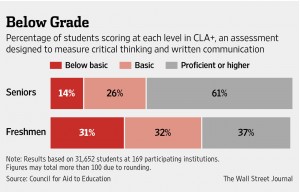A long-time friend has been posting intriguing stuff on Facebook recently. Over the last couple of days, he’s been reposting items from a website designed to tell folks from the liberal side of the world what they want to hear so that they will load a bunch of pages and hence a bunch of ads. It’s all very civic minded, of course.
Yesterday, the specific headline was this
Of course the uninformative nature of this headline forces the reader to click on it in order to discover what question the knuckle-draggers were asked. The question, unfortunately, is never clearly stated in the resulting jumbled article, although you can scan to the right and click instead on “Biggest Cheerleader Wardrobe Fails.” Apparently, the question was, “Did the U.S. find weapons of mass destruction in Iraq?”
Just to the left of the add for “These 54 Hot Chicks in Yoga Pants That Will Blow You Away!” the writer, Kerry-Anne Mendoza, notes these observations from a Fairleigh Dickinson University poll:
- 51% of Republicans believe that it’s “probably” or “definitely” true that the U.S. uncovered an active WMD program following its March 2003 invasion.
- 52% of Fox News viewers held that incorrect belief.
- The figures among Democrats and MSNBC viewers was 32% amd 14% respectively.
- A whopping 42% of respondents overall believe the U.S. found WMDs in Iraq.
Let’s be clear. The author claims there was a “study which asked respondents one simple question.” (That’s found near the top of the article, next to the add tagged “These smoking hot body paint pictures have readers asking, ‘Do I see what I think I see?'”) I would challenge any clever person to come up with “one simple question” that could yield all of the data listed above. Even if we grant them the demographic information as questions that don’t count, there are the separate questions regarding “an active WMD program” and that the “U.S. found WMDs in Iraq.”
Of course, as even Ms. Mendoza recognizes, the U.S. did find WMDs in Iraq. You don’t have to take my word for it or FoxNews’ word for it. That staunch conservative publication, The New York Times, reported it, and Ms. Mendoza actually links the article. Of course she buries this information deep in the article, long after she’s rambled on about climate change, probably assuming that readers would be distracted by “22 Awkward Engagement Photos…” by now. (Actually, for someone whose bio brags about her living in a tent at Occupy London, Mendoza is sure feeding the advertising beast pretty freely.)
My beef is not with a left-leaning, moderately capable writer cashing in on the appetites of others. There’s a market for propaganda, and she is proving herself to be a closet market capitalist by supplying that market. My beef is with my friend, a well educated and thoughtful man, who just can’t stop providing free circulation of that propaganda.
I am all in favor of differing opinions, but that which masquerades as civil discourse in our country is neither civil nor discourse.




How to Win a Super Bowl
Was Butler just lucky? To some degree, he was, but to a much larger degree he was not. He had studied game film. He knew his assignment and he knew what plays the Seahawks might run. He came into that game prepared. If he weren’t someone who prepared, he would not have been on the field, or on the team, or in the league.
Sometimes, making the big play, whether it be as a cornerback or a musician or a lawyer or a student, comes down to preparing yourself every day to do the right thing at the right time. That’s why people learn to do CPR or to fight off an attacker or to do any of a thousand less dramatic but nearly as important tasks. What you do with your day today will dictate how well you will be positioned should you find yourself standing in the wrong end zone with the Super Bowl on the line and the ball heading into your neighborhood. Congratulations, Malcolm Butler. You got yourself ready and destiny came within your grasp.
Perhaps we can learn something from that example.